When you think about tech in the federal government, it’s not exactly synonymous with a 20-person startup team. But D.C. tech connector Dcode’s new project, the Alliance for Commercial Technology in Government, is hoping to change that.
Through policy advocacy and resource sharing, the Alliance aims to advocate for tech companies looking to break into the federal government space, whether that’s the executive or legislative branch. The nonprofit trade association already has its first 50 members from across the country, a number it expects to grow significantly.
Nate Ashton, who is managing policy director at Dcode and policy advisor for the Alliance, said that the organization is hoping to make policy changes so it’s easier for startups to get their technologies in front of the federal government. Through advocacy, he hopes the Alliance can “hack through the bureaucracy” and the complexities of the government space, seeing as how many existing trade groups don’t have the bandwidth.
“I came to recognize that there was a bit of a gap in terms of the voice behind the startup community when it comes to government acquisitions and procurement,” Ashton said. “There are a lot of tech associations out there. They all…care about this, but they often have 10 other things that are higher on their priority list.”
Ashton said the Alliance has a multitude of goals: It hopes to advocate for businesses in a government contracting space; increase funding in innovative tech, R&D and IT modernization; create a culture change to expand small business innovation research and remove some of the barriers of entry by creating things like streamlined cybersecurity guidelines and simplifying security clearances. On top of lobbying at the federal level, the Alliance will provide resources for small businesses to keep their eyes on what the government is looking for, establish a community in the space and host events. As a whole, the idea is to offer easier access to a complex space.
The organization is particularly focused on advocating for startups, since the small teams often have little space for taking on policy changes and often lack the connections for federal government access. Ashton said there are a lot of recent conversations on Capitol Hill about changing the process and buying technology differently that many startups are missing out on.
“If you’ve got 20 people, 50 people or even 200 people are working on a startup outside of D.C., or if most of your work is outside of government, you’re not in the lobbying space. You’re not hiring a lobbyist to go talk about the issues that impact you,” he said.
As a longer-term goal, Ashton hopes that the policy changes can shift how the government does business with startups in order to make a more effective, modern system and increase access to the products smaller companies are making.
“From my perspective, it’s a really needed voice that was missing and one that truly believes it’s going to fundamentally be able to change the way government does business over the coming years…as the mainstay in the policy conversation,” Ashton said.







